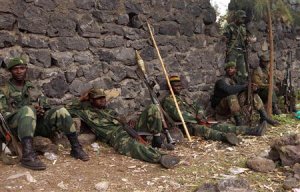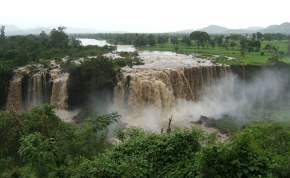Phew ! A refreshing breather..........
Congratulation Congo Army jointly with UN team.......I am proud of you all
Cheers !!!
Judy Miriga
Diaspora Spokesperson
Executive Director
Confederation Council Foundation for Africa Inc.,
USA
http://socioeconomicforum50.blogspot.com
Congo's army occupies rebel positions in breakthrough-20130831
Pete
Jones 5 hours ago

Congolese government soldiers take a break after patrolling
in Kanyarucinya village in the outskirts
KIBATI, Democratic Republic of Congo (Reuters) - In their biggest success in a year, government troops in Congo occupied strategic hills overlooking the eastern town of Goma on Friday after rebel fighters withdrew.
The M23 rebels, who have fought an 18-month uprising in the eastern borderlands of the Democratic Republic of Congo, said they quit the Kibati hills to allow an independent investigation into shelling that has killed civilians in Goma and the lakeside town of Gisenyi in neighbouring Rwanda.
Rwanda has blamed Congo for the shelling and said it would not tolerate such "provocation", raising the risk that Congo's small but militarily powerful neighbour might openly intervene in a country where it has fought two wars in the last 20 years.
Regional diplomats said Rwandan forces were seen moving north from the capital. Local media published photos of troops in armoured personnel carriers and trucks headed for the border.
Millions of people have died from violence, disease and hunger since the 1990s as foreign-backed rebel groups have fought for control of eastern Congo's rich deposits of gold, diamonds and tin, destabilising Africa's Great Lakes region.
Congolese troops have been buoyed by the intervention of a new U.N. brigade fighting alongside them to drive back the M23 rebels. "We won!" they chanted in Kibati, until Thursday a rebel outpost on the frontline overlooking Goma. Two burned-out trucks were abandoned near the hilltop position.
"They did not leave by choice, they were confronted with the power of the army," Lieutenant Colonel Olivier Hamuli, a spokesman for Congo's armed forces, told reporters.
Rwanda has in the past justified intervening in Congo by saying it must hunt down Hutu extremists who took part in its 1994 genocide. But a complex web of local politics and regional conflicts over ethnicity, land and minerals are also at play.
Rwandan Foreign Minister Louise Mushikiwabo told Reuters: "If a diplomatic resolution means Rwanda standing by, arms crossed, waiting for its territory to be bombed and its people killed, then diplomacy is definitely off the table."
Although heavy fighting inside Congo has eased, there was sporadic firing on Friday. Congolese tanks fired on what they said were rebel positions in the bush. A Reuters journalist heard firing to the east, which Hamuli blamed on Rwanda's army.
CRITICAL POINT
Rwanda has been accused by U.N. experts of backing the rebels. Kigali denies the charge but world powers have stepped up pressure on Rwanda to stay out of Congo's conflict.
Hamuli said the rebels had retreated towards Kibumba, some 10 km (6 miles) north of Kibati. "We will go to Kibumba ... we are obliged to protect the population there," he said.
A regional diplomat, who is following the situation but asked not to be named, said the rebel force appeared to have remained largely intact despite the withdrawal.
"What happens next all depends on if the Congolese are prepared to go to the negotiating table and how hard Rwanda pushes at that point," the diplomat said.
"Anything could happen at this point, we are not relaxing yet. The next 24-48 hours will be critical."
The United Nations has thrown its weight behind Congo's government, saying its peacekeepers witnessed the M23 rebels firing shells into Rwanda.
U.N. Secretary-General Ban Ki-moon, who spoke to Rwandan President Paul Kagame on Thursday, condemned what his spokesman called indiscriminate shelling by the M23 that caused deaths among the civilian population, and urged parties to pursue a political process.
The M23 rebels, named after a March 23, 2009, peace deal that ended four years of rebellion in eastern Congo, took up arms last year saying the government had failed to honour the agreement, which included integrating them into the army.
After seizing Goma in November, the rebels further demanded Congo's President Joseph Kabila hold national talks, release political prisoners and disband the electoral commission.
Speaking on French radio RFI, M23 leader Bertrand Bisimwa called on Congo to resume stalled, Ugandan-hosted negotiations to end the conflict.
Congo's government spokesman, Lambert Mende, rejected any resumption of peace talks, saying the M23 must first disarm, demobilise and become a political party.
A Tanzanian peacekeeper was killed on Wednesday, the first death since the new U.N. brigade engaged rebels last week.
South Africa's military said on Friday it had received a request from the United Nations for three of its Rooivalk (Red Kestrel) attack helicopters to be sent to Congo.



















